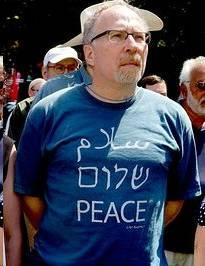
Rabbi Shawn Zevit
Parshat VaYishlach
In this week’s Torah portion, Jacob is grappling with fear at the prospect of returning home to his parents’ house more than 20 years after he left.
Last he heard, his father Isaac was dying, his twin Esau was ready to kill him and just about everyone was angry at him for tricking Isaac into blessing the “wrong” son. He had run in fear of Esau’s rage and perhaps in shame at having hurt his father; and now he was finally coming home to face his brother and his past.
Jacob left Canaan and the family with absolutely nothing. He is coming back with flocks and herds, money and, most importantly, with family. Yet the consequences of his actions all those years ago could wipe out everything important to him now, everyone he loved.
So, with all this fear, panic and worry on his mind, Jacob sends his family ahead of him, sends all his possessions ahead of him and he is left alone, just like when he started.
Alone, Jacob wrestles with a man, or an angel, with the projected image of Esau or himself, until daybreak. Jacob struggles with this being, until the being wrenches Jacob’s hip out of its socket, and Jacob still does not let him go. He holds onto the messenger, who is causing him intense pain, and Jacob demands a blessing from him.
“A man [ish] wrestled with him until dawn … and he [Jacob] said ‘I will not let you go until you bless me’ … and he [the ish] said ‘Your name shall no longer be Jacob, but YisraEl, for you have striven with beings divine and human, and you have prevailed.’” (Genesis 32: 25-29)
All of us struggle with our beings, many of us at night. Like Jacob, we may hold right on to the very things with which we are struggling. We hold on to the anger, the fear, the resentments that we know plague us and give us no rest. We hold on to that which we should let go. One lesson is to find a way to turn the struggle we are holding into a blessing for us — to find the blessing within the struggle.
After holding onto the messenger, and demanding the blessing, Jacob says “I have seen God face to face, and my life is preserved.” That experience allowed him to later see God also in the face of Esau when they finally meet. After they kiss and hug, Jacob tells Esau “I have seen your face, which is like seeing the face of a Divine being.” (Genesis 33:10)
Given the most recent massacre and captivity of Israelis and citizens of other countries, including Americans, by Hamas, and the mass suffering and deaths of civilians in Gaza, it is heartbreaking to see our ancient brothers find their way home to each other, yet we and our shared descendants today, so unable or unwilling to find a liberating blessing that enables us to move beyond the past and heal.
Even some of our sages across the ages could not manage Esau and Jacob’s reconciliation in the face of their own pain and interpreted their kiss as a bite! (See sefaria.org/sheets/206635?lang=bi.)
In Torah, a changed name is an indication of transformation in a person. But Jacob is not always called Israel from here on; he is both Jacob and Israel for the rest of his life. Jacob: the one who tricked his brother and lived in fear and regret of his past, the one who was a “man of the tent,” a man of this world. And Israel: the one who faces his fears and rises above them, who integrates his past and sees a bright future, who looks up and sees God in the face of the Other.
Our tradition teaches that we all have both a Jacob-consciousness and an Israel-consciousness. We wake up each day and are often immediately consumed with “matters of the tent”: getting the kids fed and off to school, running to make it to work on time, the news and the world around us crashing in.
And yet, like Jacob, there are moments when we may rise to the place of Israel; seeking and finding the higher sense of meaning, purpose, holiness, forgiveness, and love — the spiritual realities that exist right along the material ones. These moments do not always come easily, and they do not always last once attained.
Having the name Israel does not mean that Jacob, or any of us, can live there all the time. I pray with all my heart that those moments of loving connection, of seeing the Face of God, the angel of our better selves in each other, will give all of humanity something to reach for.
And in that wrestling, receive the blessings of true peace and reconciliation. Our Torah shows us it is possible
Rabbi Shawn Israel Zevit serves as rabbi at Mishkan Shalom in Philadelphia. He is the co-founder/director of the Davennen Leader’s Training Institute and is the director of the ALEPH Hashpa’ah (Spiritual Direction) Training Program and mentor with the Clergy Leadership Incubator. The Board of Rabbis of Greater Philadelphia is proud to provide diverse perspectives on Torah commentary for the Jewish Exponent. The opinions expressed in this column are the author’s own and do not necessarily reflect the view of the Board of Rabbis.





